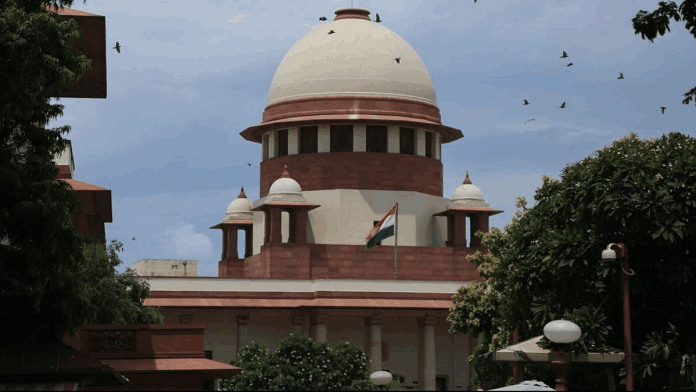New Delhi: While the nation celebrates 75 years of Independence, some police officers continue to violate fundamental rights of citizens guaranteed by the Constitution, said the Supreme Court Monday as it criticised the Telangana police for misusing the state’s preventive detention law.
A bench of justices Surya Kant and Dipankar Datta made the observation Monday while quashing a detention order against a man identified in the order as Salman Khan, whose wife had moved the Supreme Court challenging a 28 June Telangana High Court dismissal of a plea for his release.
According to the Supreme Court order, Khan was detained under the Telangana Prevention of Dangerous Activities Act, 1986, on 27 January this year. The five FIRs registered against him were related to obstruction of public servant in discharge of his/her public functions, extortion and cheating, assault or criminal force against women, criminal intimidation and robbery, mentioned the court order.
The Telangana government order dated 20 May this year to continue Khan’s detention for 12 months was based on the report of the advisory board constituted under the Act, which stated that there was sufficient cause for detention. Thereafter, the appellant approached the Telangana High Court through a writ petition which was dismissed.
Setting aside the detention order, the top court said it was “indefensible” because the alleged acts committed by Khan were separate and stray acts, which only affected private persons, but did not hamper the “flow of public life”.
The bench took note of the “pernicious trend” of the alleged usage of preventive detention provisions in Telangana and said, “While the nation celebrates Azadi Ka Amrit Mahotsav to commemorate 75 years of Independence from foreign rule, some police officers of the said state who are enjoined with the duty to prevent crimes and are equally responsible for protecting the rights of citizens as well, seem to be oblivious of the fundamental rights guaranteed by the Constitution and are curbing the liberty and freedom of the people.”
It faulted the basis on which the detention order was imposed and said: “…It is not open to the detaining authority to simply refer to stale incidents and hold them as the basis of an order of detention. Such stale material will have no bearing on the probability of the detenu engaging in prejudicial activities in the future.”
It also referred to a 2022 judgment of the top court that had strongly deprecated the manner in which Telangana invoked the detention law and had reprobated its use in the last five years. Last year, a bench led by Chief Justice D.Y. Chandrachud had come down heavily on Telangana for abusing the law.
The court emphasised the principles of preventive detention and provided a 10-point test to check the legality and constitutionality of the detention orders passed by the executive.
Court’s check-list
According to the apex court, the detention order should be based on requisite satisfaction of the detaining authority, which should apply its mind to “all relevant circumstances,” without basing it on “material extraneous to the scope and purpose of the statute.”
Further, it should be seen if the authority has acted independently and if it has applied the self-created rules or policy while issuing the detention order. Moreover, the authority should adhere strictly to the timelines provided under the law and also the grounds on which the preventive order rests should not be vague.
“If circumstances appear therefrom raising a doubt of the detaining authority misconceiving his own powers, the court ought not to shut its eyes; even not venturing to make any attempt to investigate the sufficiency of the materials, an enquiry can be made by the Court into the authority’s notions of his power,” the bench stated.
According to the Supreme Court order, the apex court broadly looked into two issues to adjudicate the matter. Firstly, whether the acts of the person detained are detrimental to public order and secondly whether there were any extraneous factors involved by the detaining authority while passing the detention order.
(Edited by Smriti Sinha)
Also read: Manipur govt clashes with SC panel’s lawyer, calls submission on poor relief camp conditions ‘false’



